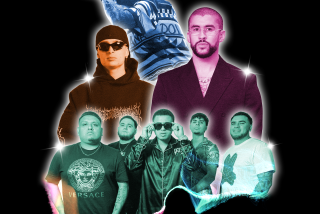Today’s music industry: Not the same old song and dance
- Share via
In the last decade, technology has reshaped industries and redefined the very nature of work for many Americans. Yet even as the world has shifted, some jobs remain unaffected. In honor of Labor Day, we asked writers from four different fields to discuss how their fields have -- or have not -- changed.
--
The invention of the phonograph was going to discourage people from going out to see live music. The introduction of music radio was a surefire way of killing record sales. “Home taping is killing music” screamed the magazine ads when the cassette tape was introduced to the marketplace.
Of course, each of those sky-is-falling alerts from the music industry over the last century was a false alarm. With each technological innovation, music became more accessible and more lucrative than ever. By 1999, the music industry had become a nearly $15-billion-a-year juggernaut.
That’s also the year when the bottom started falling out of compact disc sales, and this time the industry’s panic was justified. Although new technology has meant that more people than ever are listening to music, it also has meant that record companies are no longer in full control. The Internet has made it easy for artists to market direct to consumer -- and for fans to acquire music free through file sharing. By some music biz estimates, for every music file that is purchased online, 40 are shared -- or “stolen,” if you prefer to use the industry’s parlance.
But music is alive and well, even if the music industry is not. A new grass-roots industry is taking shape, though how it will eventually look is anybody’s guess. Once a handful of big corporations funneled heavily marketed recordings by superstar artists through a few radio chains and MTV to the public. In place of that top-heavy business model, a new, more chaotic brand of self-marketing is emerging, fueled by tweets, text messages and MP3 files.
Roles have changed. Bands can now become de facto record companies: not only creating art but then distributing and publicizing it through websites and e-mail. And fans are no longer a faceless marketing demographic to which products are sold; they have become more like co-conspirators with the artists. They’re not only viral advocates for bands, they’re collaborators -- participating in remixes and videos, and by extension helping shape careers. They’re invested in music personally in a way that wasn’t possible a decade ago.
Not that infrastructure is unnecessary or going away. The major labels still exist as big marketing machines, as anyone who’s aware of the new album by Whitney Houston or the CD reissues by the Beatles can attest. But the industry, like the music itself, is fragmenting into community-based niches and subcultures. The trend is toward smaller, self-contained units. Bands and artists who are already global brands, from Radiohead to Jay-Z, find they have more flexibility and keep more of the profit if they release music without having to deal with corporate politics. And smaller acts, from Girl Talk to Dan Deacon, are using recordings as advertisements for increasingly lucrative live performances.
Indeed, the new way of doing business has hardly done away with the past. On the contrary, cutting-edge technology that allows artists to connect with their fans 24/7 is building up an appetite for the oldest form of music distribution: the troubadour with the guitar (or laptop) slung across his back traveling from town to town to play for people. That’s one musical experience that can’t be digitized.
More to Read
The biggest entertainment stories
Get our big stories about Hollywood, film, television, music, arts, culture and more right in your inbox as soon as they publish.
You may occasionally receive promotional content from the Los Angeles Times.









